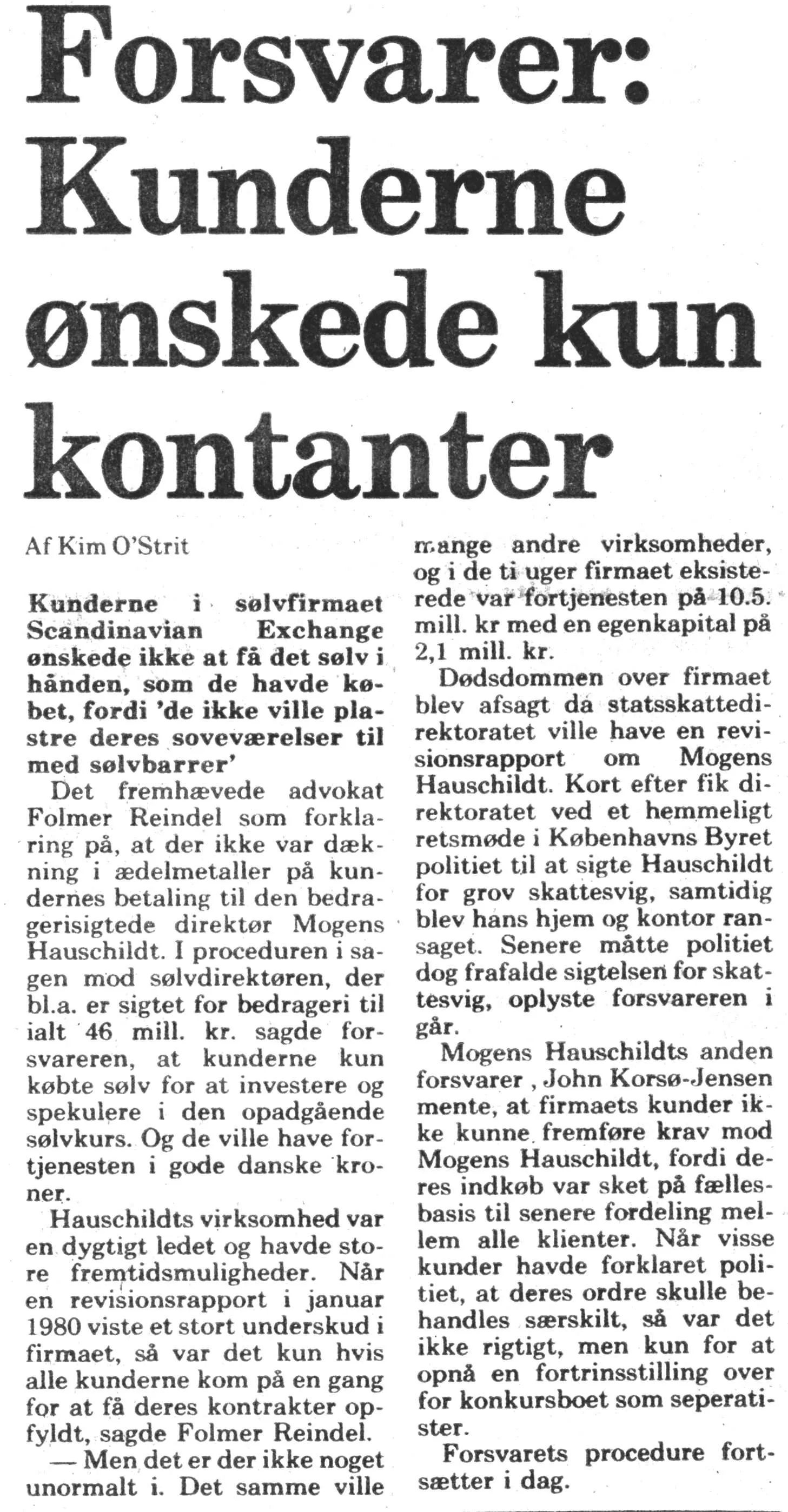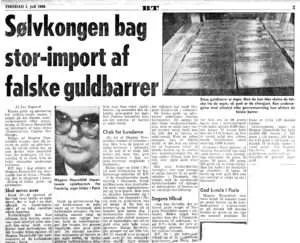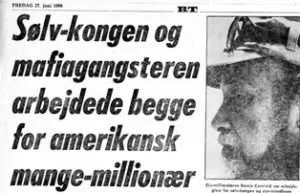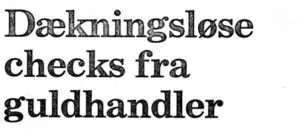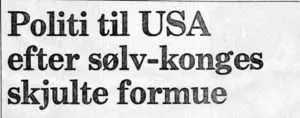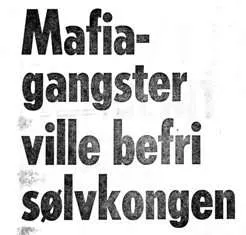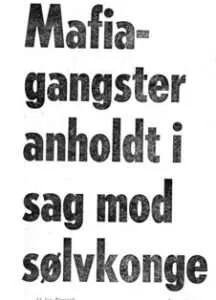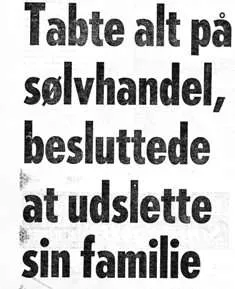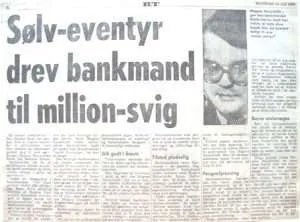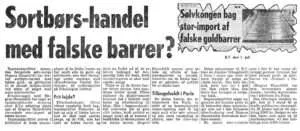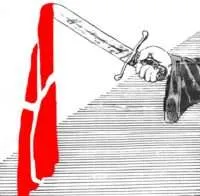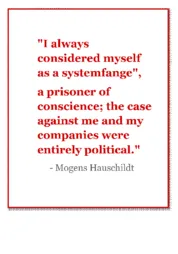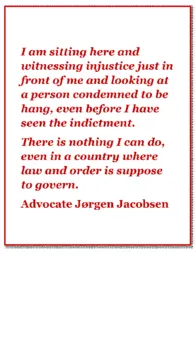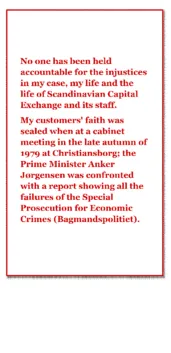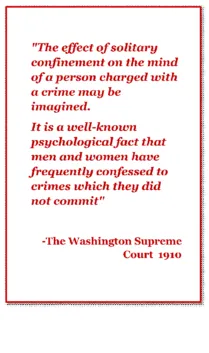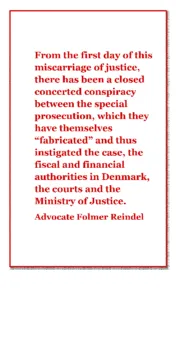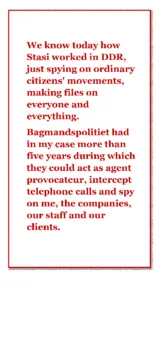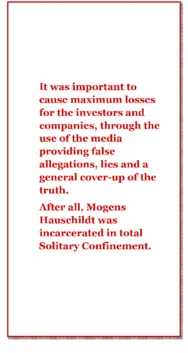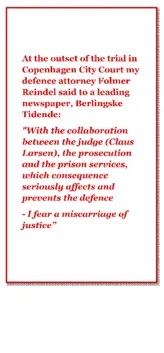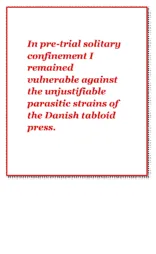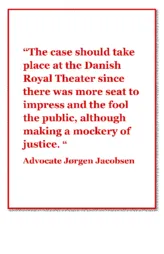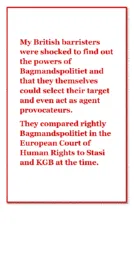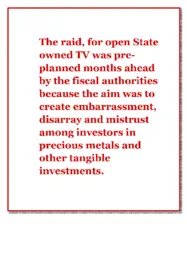Bagmandspolitiet used “Zersetzung”
The attempt to distort reality and the truth
Organized Corporate Stalking
Bagmandspolitiet had for years been stalking Scandinavian Capital Exchange, Criminal commissioner Mogens Kanding from Bagmandspolitiet told Jyllands-Posten, Friday the 1st February 1980, the day after Bagmandspolitiet stormed the companies and my arrest for alleged tax evasion.
“We have been investigating the company since it started (1974) just to see what is happening. Approximately three weeks ago our investigation became more intensive on our own initiative. We have not received any complaints“.
Bagmandspolitiet has been investigating the company for near six years just to see what? Just like Stasi or KGB. As Stalin said, “Show me a person and I will always find a reason against him” (to kill him or send him to Gulag.).

In the companies, we knew that the Danish the authorities had been harassing us constantly for years, but we did not know that Bagmandspolitiet was involved, see: Five years of continuous harassments before the event.
No complaint had been made to the police and the Special Prosecution. The fact that they later claimed that the Copenhagen fiscal authorities had asked a judge for a warrant for my arrest for tax evasion – is another matter.
Nevertheless, according to the newspaper and what they were told, Bagmandspolitiet decided to take the action. Further, that black money is invested in precious metals and the profits are tax-free outside the reach of the fiscal authorities.
I was never charged with tax evasion since this was a trumped-up charge and there truly was no tax evasion by me or the companies.
Regularly Blackmailed
We had been regularly blackmailed by the Copenhagen Tax Authorities (Københavns Skattevæsen), who wanted access to the names of our clients and their transactions. On one occasion in 1979, they demanded that we pay tax there and then on all future income despite losses in the previous year (we had handed over D.Kr. 200,000; otherwise the tax inspector would not leave our head office.
So Bagmandspolitiet had been looking for six years at SCE and indeed my activity. In East Germany, the DDR, they used Zersetzung (attrition or corrosion) to name their harassment tactics: the aim was to disrupt the working of groups and the lives of individuals to such a degree that defence became ineffective, or more preferably, ceased altogether.
Defence by rendering it ineffective, with an interim goal of hindering any positive media or public exposure.
The Stasi did not care whether an individual was switched off through disillusionment, fear, burn-out or mental illness: all outcomes were acceptable, and people’s mental health and social standing during or after an operation were of no interest to the officers involved.
The Stasi often used Zersetzung, and it’s described in another guideline. The word is difficult to translate because it means originally “biodegradation”. But actually, it’s a quite accurate description. The goal was to destroy secretly the self-confidence of people, for example by damaging their reputation, by organizing failures in their lives.
Many people succumbed to pressure from the Stasi, often because of mental health difficulties (brought about by the pressure) or through a process that was commonly called ‘inner migration’: giving up political and social beliefs, following the path of least resistance and ceasing oppositional activity.
Zersetzung shows what was hidden behind this repression strategy, what its goals and consequences were, and how people were specifically affected. In Germany, quite a few victims still suffer from the demolition measures of state security, live in isolation and suffer from anxiety. There is little hope for legal rehabilitation, as direct instructions on the use of decomposition methods are seldom found on the file, and regular puncturing of tires, or constant nocturnal noise nuisance, is difficult to legally impose. So it is all the more important to raise this particularly perfidious repression tool of the State Security and its victims by an exhibition in the focus of public debate.

On the basis of contemporary witness statements, documents and research by the political scientist Sandra Pingel-Schliemann’s ten panels show the unscrupulous handling of the state apparatus with the personal fates of the targeted and alleged oppositionists.
Agent Provocateurs
In late 1979, several incidents took place where people came to SCE and told us various “stories” asking for advice and assistance from the company. At the time we thought that these people must have been sent by the National Bank or the fiscal authorities. Considering the seriousness of such provocateurs, I asked the staff to report such incidents directly to me, moreover, be observant and vigilant. Apart from the usual cranks, some people even made it hold a meeting with me and other senior staff. Some of their proposals were completely stupid, others were quite obvious with the intention of crossing the line of legality.
We listed many incidents and in one case I recall a woman pretending to be an investor and claiming to have D.Kr 2 million to invest in silver bars. She told the staff that she had made this money in Greenland and really wanted to take the money out of Denmark. In buying silver bars, she could transport them across the border and sell them outside of Denmark one day. Silver bars were considered as “goods” and subject to sales tax and the EU laws of free movement of goods. We refused to assist her since it could be seen as a way around the strict Danish exchange control regulation at the time. She and the other people were all agent provocateurs sent by the Special Prosecution
After being in Solitary confinement one becomes unengaged with emotions stripped from all human dignity
When again and again people have been subject to injustice and tragedy, at some point one somewhat comes to disregard one’s feelings and surroundings.
You can only reach the bottom of despair after which there is really nothing that can hurt; one becomes unengaged with emotions stripped from all human dignity. The most effective use of Stasi techniques was carried out with my total solitary confinement, even with systematically study such clandestine abuses of psychology, even with the collaboration of the hospital doctors. In my experience, I believed the doctors in Vestre Prison at the time assisted the prosecution.
Many times I told the doctors and indeed the nurses that they acted against the 1975 Declaration of Tokyo the Tokyo Conventions and their oath. “[t]he doctor shall not countenance, condone or participate in the practice of torture or other forms of cruel, inhumane, or degrading procedures, whatever the offence of which the victim of such procedures is suspected, accused or guilty, and whatever the victim’s beliefs or motives, and in all situations, including armed conflict or civil strife.” In the Declaration of Tokyo, torture is defined as “the deliberate, systematic or wanton infliction of physical or mental suffering by one or more persons acting alone or on the orders of any authority . . . .” I witnessed how doctors introduced strong medication to people in solitary confinement, even outside in prison at the time, specifically if the police or prosecution had a weak case. This medication was an open door to drug abuse, later on, obviously making the accused unable to defend himself-
I consider the unlawful methods used and the abuse of power and injustice, which my loved ones and I have been subjected to, to be of the same character and disposition which sent people to concentrations camps forty years ago and now in Russia. I believe that I would not be moved emotionally if the door to my torture cell was opened and they told me: Hauschildt you will now go to the torture chamber or you have been given a thirty years sentence. I do understand the poor people in the Gulag of injustices.”
In writing this, I did not know that I would remain in my pre-trial torture cell for another nine months after that, not seeing my wife, sons and mother sometimes for so many months. Moreover, remain in pre-trial detentions for more than four years.
My disgust and aversion towards Bagmandspolitiet at the time, also to the prison guards, made my life even more difficult since it left me alone for weeks – alone with my own thoughts and apprehensions.
Yes, I did do something unlawful from my solitary confinement in a moment of madness
I did indeed commit various unlawful acts, even so-called “criminal acts”, like giving instructions to my wife to go abroad and get help and money and later asking her for help to get me out from prison. After all, my wife could legally go abroad and indeed secure the companies and our family’s assets and more importantly, instruct and pay lawyers to assist. Most of these instructions were made during my solitary confinement and some shortly thereafter.
One could claim that these instructions “broke the Danish law”, despite that the claims I made was against my own companies abroad and companies which were solvent at the time, moreover assets which I later received. Nevertheless, the claims and actions can e seen as ridiculous and on reflection, made steps, but they were a result of my mental state and hopelessness at the time.
I simply had to do something; I saw all the actions taken against me by Bagmandspolitiet as unlawful, political and criminal since I was innocent.
When you face so much injustice, you somehow feel inclined to do something and to take some kind of action, even which can be considered stupid later after doing it. Solitary confinement for months on end is torture and your mental capacity changes as a result. I planned all sorts of actions, but nothing serious.
How low and ridiculous Bagmandspolitiet became when it prosecuted me for actions which I had participated in long into my solitary confinement. Any psychiatrist would have declared me mentally ill and not responsible and indeed unfit even for trial; moreover, my actions had only been to write instructions to my wife, mostly instructions which she did not carry out.
The solitary confinement just distorted everything including my mental ability to think straight, and even worse – to concentrate. When my lawyer went away on holiday and had other matters to attend to, in March/April 1980, I did not speak to any person for weeks and after a month I found that I had lost my voice and could not speak.
The Special Prosecution took full advantage of using psychological methods, like instructing that without any warning, I was always brought straight to a courtroom or a meeting at their offices so that I would be shaken, disoriented and confused. They also instructed, at any time searches of the cell, where several people certainly would enter my little space, so overwhelming and frightening. Like the colleagues in Stasi and KGB, they knew all the tricks of the trade.
Frankly, I was very shaken and found coming from solitary confinement straight into a room with people (in fact anyone), to be chaotic every time which was so overwhelming as well as a frightening experience for me.
No defence lawyer ever-present
Although, we knew from television that when an accused is interviewed by the police (prosecution in my case) a lawyer should be present. I frankly can’t recall more than once that I had my defence lawyer by my side. I was taken regularly “in bed” and told that I will be taken to Bagmandspolitiet’s office. They came from Bagmandspolitiet to the prison to collect me. Never mind that I had not been sleeping that night or for many nights, never mind that I felt sick. It was clear as snow, that they used the instrument of solitary confinement to obtain information and confessions in such a manner it was a clear violation of torture pursuant to Convention of Human Rights, moreover, I had been subjected to psychological torture by virtue of alone of my detention in total solitary confinement and the treatment by Bagmandpolitiet.
In writing about this, I specifically recall the smell of their offices and all the smoke mixed with the stale coffee smell. As I have all my life been a non-smoker, sitting opposite two uncouth people constantly lighting up a cigarette, puffing smoke into your face, and me having had no breakfast, makes me sick just reliving this nightmare near 40 years ago. I further recall, that my clothes were sticking of smoke when I returned in the evening to my cell. Considering there was no open window or another way I could ventilate the clothes, I had to accept this stink of smoke.
The horror of Interrogation
Yes, the horror, not that I had anything to hide as such, but surrounded by 2-3 people, just asking questions and bombarding me with outrageous statements and assumptions. I am sitting there for hours, hour after hour, this went on for more than 16 months, as the indictment was not prepared. They worked on the prosecution – on the basis that I would either commit murder in prison or just die.
They all left the room, one by one in rotation, going outside to speak to others, whispering behind the door, so to say. Other times, people I had never seen just “dropped in” or gazed through the window in the door, just like I was an animal in the Zoo.
My real problem, I was dealing with mostly total uneducated people, the kind of policeman by birth. We all remember playing robbers and cops when small, they had always been cops, the uneducated ones, just eager for power. Nearly all members from Bagmandspolitiet I was in contact with, did not speak English, and apart from Majorca, I do not think they travelled outside Denmark. Worse still, since they did not understand most things in “my business” their ignorance had no borders. What they were too stupid to understand, even it was normal or a norm in my business, my actions became “criminalised” making everything grey and clouded. I could as well be speaking to 3-4-year-old children, they simply had no understanding.
The more “humane” solitary torture
Whereas people that are in pre-trial detention solitary confinement in Denmark now (see Rodhe vs. Denmark 2005), receive regular visits by various people such as prison teachers, the chaplain, welfare officers all in addition to having regular medical inspections. Moreover, they are allowed to use the fitness room (gym) and receive tuition and even having the use of a physiotherapist. Their cell contains television and a refrigerator/freezing compartment.
I did not have any of this happening to me, none so ever. In stating this, it is only fair to say that I could have asked to see the prison chaplain or a medical doctor, but I simply did not trust nor did I want to speak to these people at the time.
What was really frightening, I did not trust the prison doctors, and only asked to be seen by doctors from outside the prison, specific, a psychiatrist. This was through the 309 days solitary confinement and afterwards, was always refused, so through 1492 days I never was allowed such contact. I did not speak to doctors for months, even I did not sleep at night, I never accepted sleeping tablets, as I had no trust in the doctors. My fear was confirmed later when I saw doctors “prepare” prisoners either to go for interrogation or to the court. I witnessed so many prisoners certainly becoming depended on regular medication and later turning to drugs.
It was first when I went on a hunger strike and refused food, only taking water and a vitamin tablet, the doctors did visit me and took urine samples. Ultimately, the doctors ordered me to the hospital department.
Most people read about hunger strikes and truly have no idea about how difficult it is. The human body will fight every moment, every hour and day against the human will. To refuse food is not only against our natural instinct but very difficult as one have every moment to overcome oneself. I only took water and 2 vitamin tablets. In the end, I had to tire a scarf around my fingers to remind myself to drink water, you do not feel thirsty or anything.
After being alone over a long period, even to speak to people become a problem. It is characteristic that Rodhe asked to stay in solitary confinement after his long incarceration – this is quite normal because other people close to you become frightening and you want to be left alone. You can practically feel their space and it can be very overwhelming.
They Slowly Destroy Your Humanity
The people working in prison and the prison environment slowly destroy your humanity. I registered that I had been personally subject to nearly one thousand searches during the years; when you are undressed regularly and everything you have is searched and gone through, your humanity slowly disappears and apathy takes over. These searches break down your dignity.
The prosecution or the prison guards could come and go through everything at any time, everything you have written down, everything you have in your Spartan cell. This random search is part of the process to break you down and make you amenable.
Dignity had slowly but steadily run into the sand and I was left without any my dignity, gone forever. Privacy is an inherent human right and a requirement for maintaining the human condition with dignity and respect.
When you are stripped from all dignity and locked up in a cell with cold walls, hearing screams from others either crying out in their misery or being beaten by prison guards and you can’t do anything – your humanity slowly disappears.
In pre-trial solitary confinement, I remained vulnerable against the unjustifiable parasitic strains of the Danish tabloid press.
Mogens Hauschildt
When you face so much injustice, you somehow feel good to do something and to take some kind of action, even an action which can be considered stupid at the time when you look back later on. Solitary confinement for months on end is torture and your mental capacity changes as a result.
The actions I took where: two hunger strikes (one for seventeen days and the other for fifty-five days, just drinking water) and writing ridiculous instructions to my wife which I later was prosecuted for. I lost more than fifty-seven kilograms in weight; when I was arrested my weight was one hundred and twenty kilograms and after my last hunger strike it was sixty-seven kilograms.
It was worse to be in solitary confinement in Denmark because I was not “mentally” prepared for the solitary confinement; I had, as a result, a much greater trauma. When I say mentally prepared, I relate to the fact that if I lived in Russia or another totalitarian country or if I was a prisoner of war in Vietnam, I would know what could happen if you were arrested. Under such conditions, our mind is somewhat able to adjust to much more pressure.
I knew that I was innocent and in the first few months of my solitary confinement, not only did I lose out a large amount of money daily, everything I had worked for and my family was being destroyed day by day by the Special Prosecution.
In my solitary confinement during the summer months of 1980, I did not speak a word to any person; at the same time I could hear the children from the nearby playground (where I myself played football as child), and even worse, the sound from a nearby kindergarten where I heard the voices of happy children – I love children
I did not want to show to the Special Prosecution or the court that they could break me down by all their actions and injustices. Moreover, I did not want to show my family and sons what had happened to me.
Therefore I suppressed a lot of traumatic experience at the time. To make matters worse, I was never allowed a proper diagnosis and treatment. Since it was obvious that I suffered from post-traumatic stress disorder (PTSD), after my solitary confinement – having been subjected to psychological trauma – getting treatment as soon as possible after PTSD symptoms developed could prevent PTSD from becoming a long-term condition.
“The effect of solitary confinement on the mind of a person charged with a crime may be imagined. It is a well-known psychological fact that men and women have frequently confessed to crimes which they did not commit”
– The Washington Supreme Court 1910
Not Permitted to See A Respected Psychiatrist
My defence lawyers and I asked the court on many occasion for permission for me to see a respected Danish psychiatrist Mogens Jacobsen. Through the more than four years, the courts and the prosecution did not want me to get “outside” help; they simply did not want me to expose what had happened to me and the “mental scars” from the invisible torture. Mental scars which really made me unfit to stand trial.
No psychological or psychiatric examination was carried out on me during the more than four years of pre-trial detention.
The fact that the Danish authorities (Ministry of Justice, courts and prosecutions) did not permit me outside help and treatment during my long incarceration, caused me to suffer from the following: severe stress symptoms, reoccurring nightmares and flashbacks, panic attacks, extreme agitation and irritability, amnesia and severe anxiety, migraines, severe depression and feelings of worthlessness.
I possibly also suffered from bipolar disorder (also known as manic depression) which involves abnormally “high” or pressured mood states, known as mania or hypomania, alternating with normal or depressed moods. At times all of this can overwhelm me and my ability to cope. I still have increased arousal and therefore difficulty in falling and staying asleep, and have hypervigilance at times. All this was an effect of psychological trauma during my long pre-trial solitary confinement.
New research has revealed how severe trauma can produce long-term changes in the nerves in the brain. In particular, it is now believed that the problem is caused by alterations in the chemical substances that nerves in the brain use to communicate with each other, substances referred to as neurotransmitters.
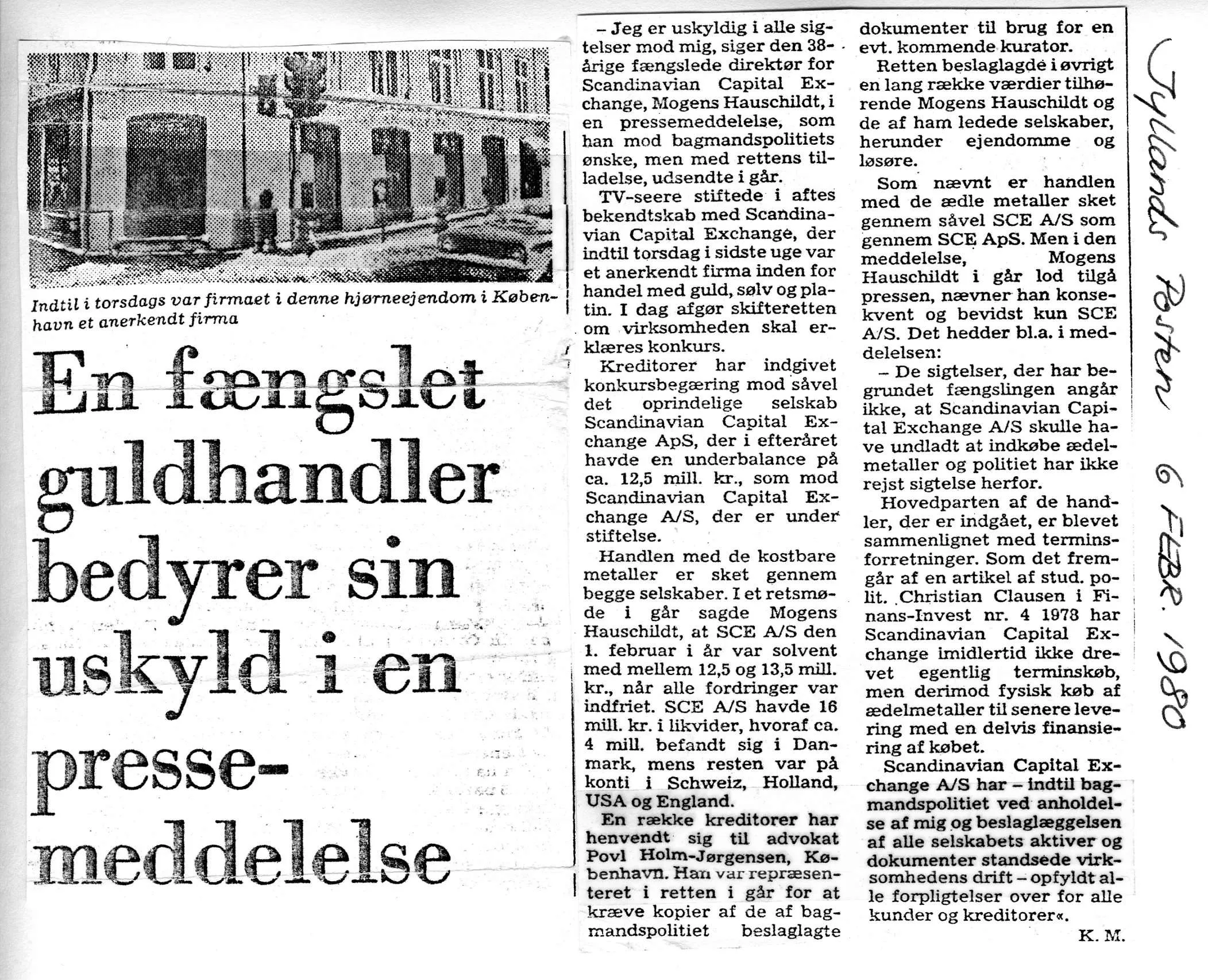
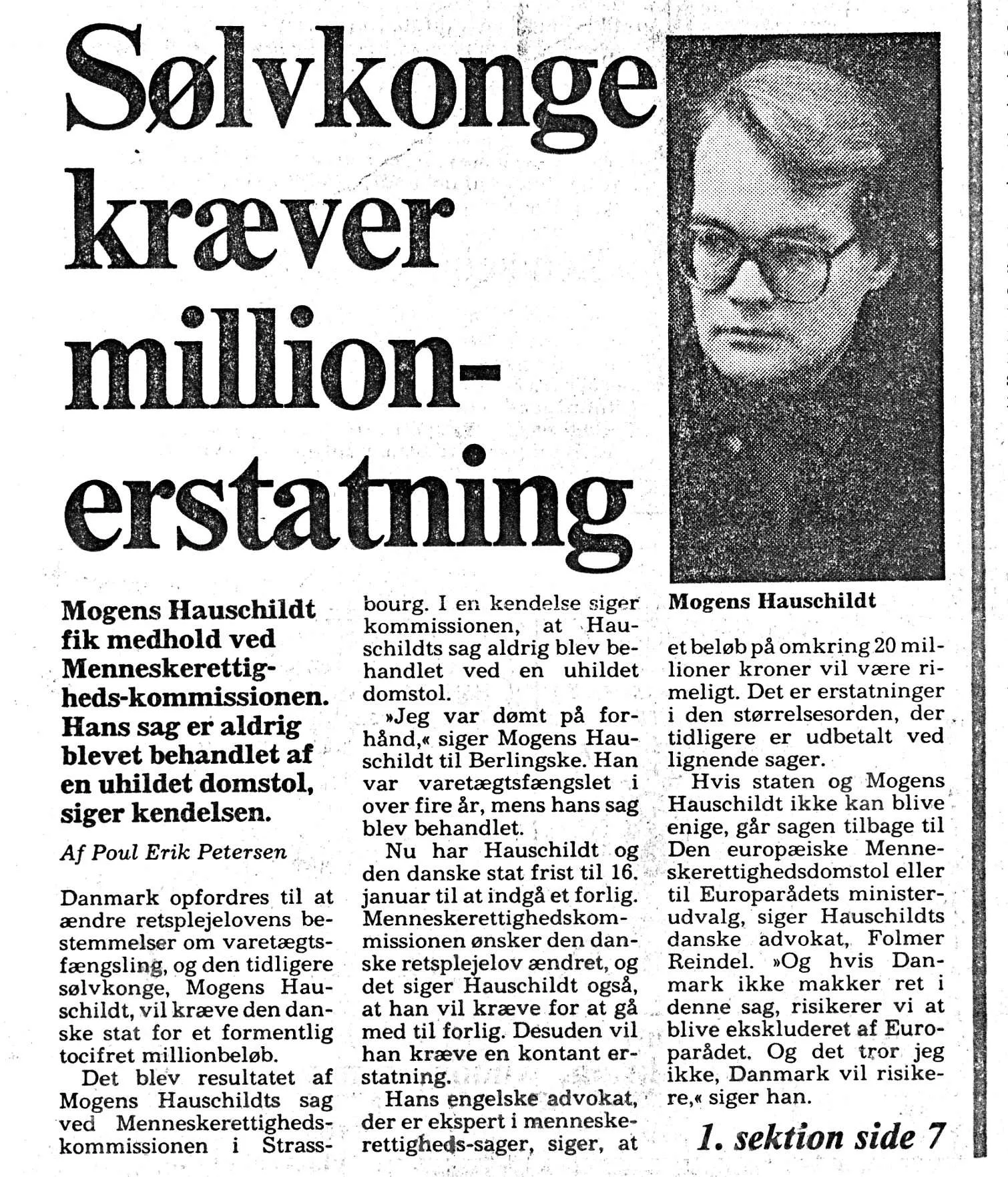

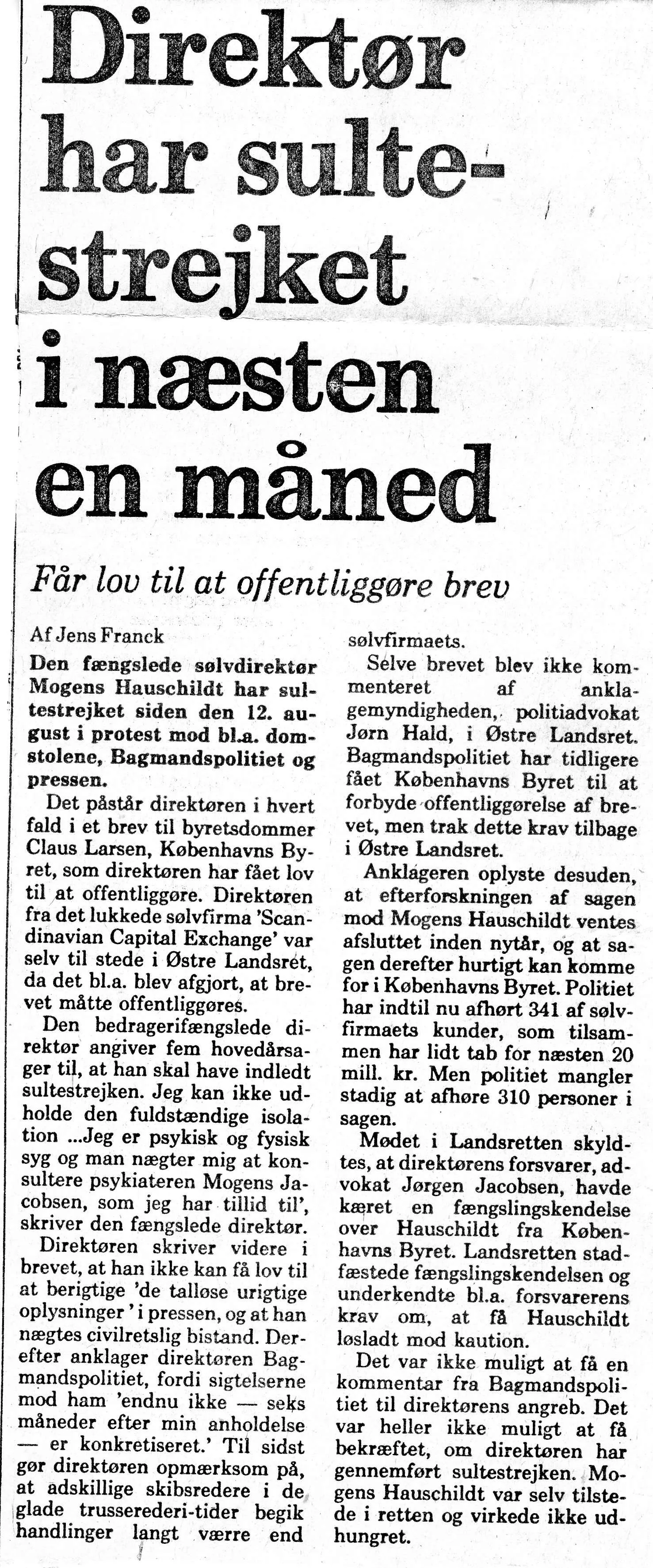
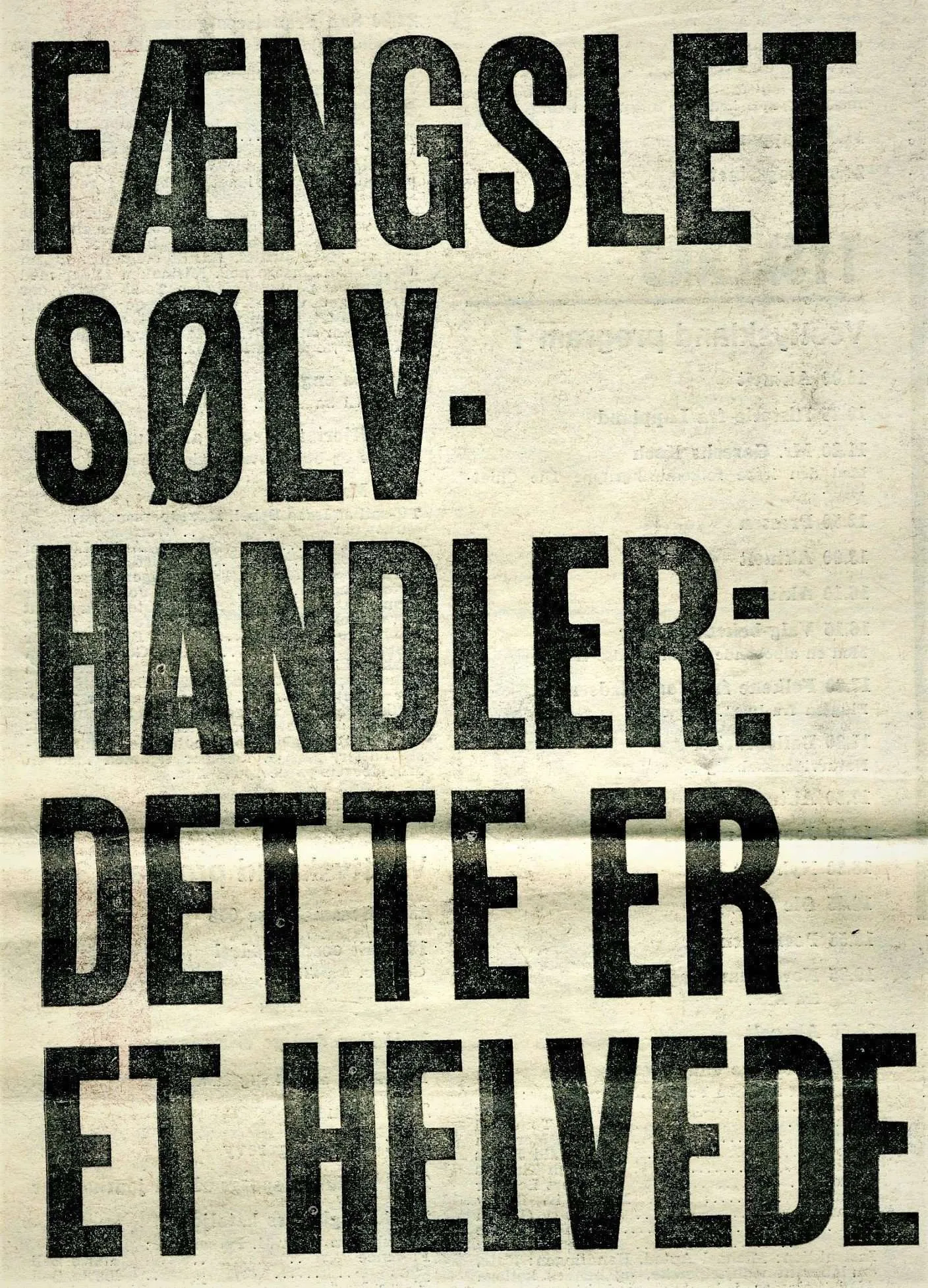
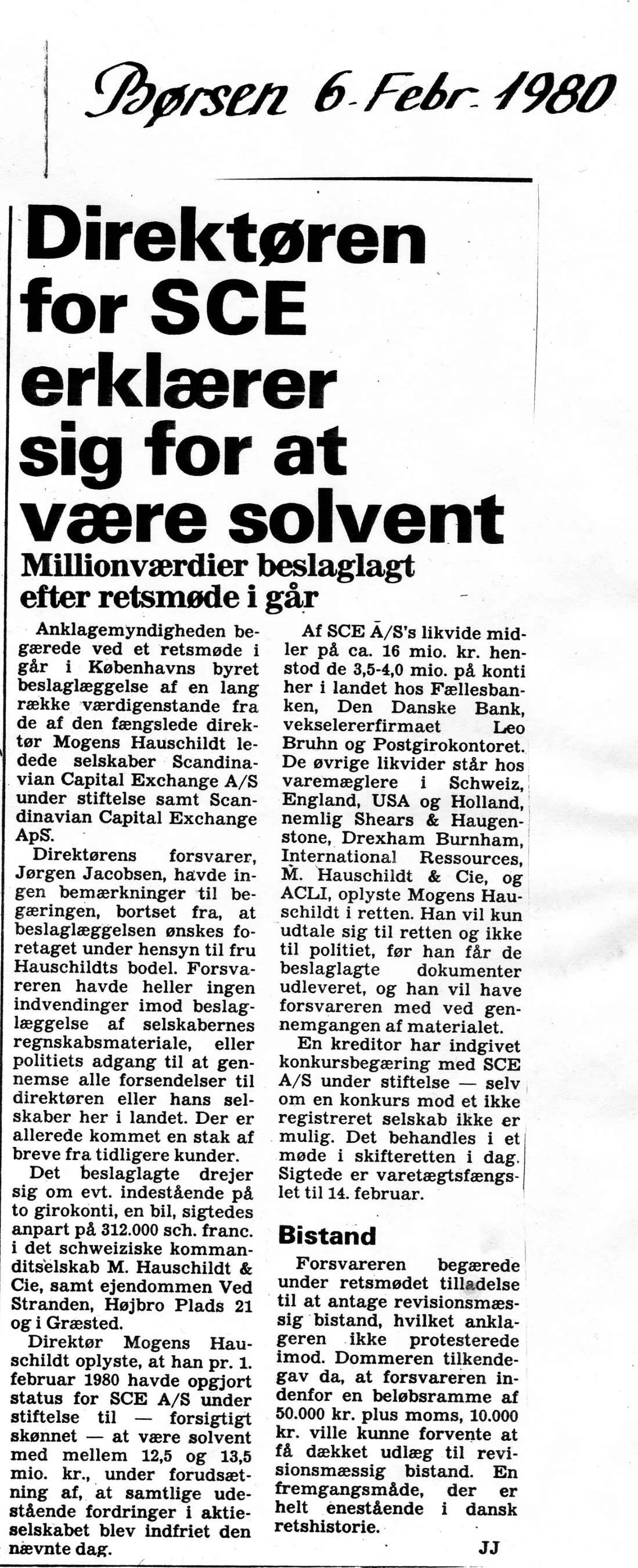
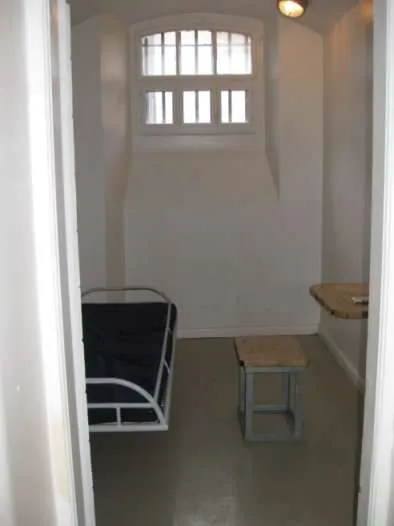
This was my solitary confinement cell, and later the kind of cell I remained in during my 1492 days pre-trial incarceration - just this cell is newly painted and with better lights and stone floor
